Kevin Kelly. I took three pages of notes from this man. His talk steamrolled through the future.
Some of you might know that I’m in the opening stages of writing a book. There are so many things he said that fall right in line with the stuff that I’ve been working on, that it was a huge encouragement that I’m heading in the right direction. The hesitation for me is to question how my voice can even begin to matter when someone like Kevin Kelly is saying similar things… he’s going to do it bigger/better with a larger audience… so there is this fear of why should I even try?
I think for me the key here is that while I ate up his stuff, while I thought it was phenomenal, while for me just hearing this one session was worth the cost of admission… looking around I saw a lot of people that just didn’t “get it.” The issue is a matter of what voice do you bring to these conversations. I may not have as much experience as Kelly, but I have my own, unique voice. Perhaps people might resonate with my sentence structure and vocabulary more than they can with Kelly. Perhaps have do have some new and unique perspectives. Perhaps there is room for me at this table of conversation. But after listening to this man just throw out idea after idea that each are so revolutionary that (in my opinion) Fermi needs to consider having a full-fledged futurist conversation, it’s a bit intimidating. But I digress.
I could spend 10,000 words pouring through the wisdom that Kelly spilled onto the Tabernacle floor. I think these notes will be something I return to several times. Let’s just try to get through a couple of the more “key” concepts and things that really set off stuff for me.
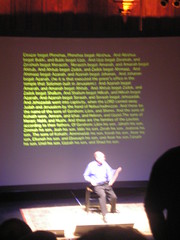
First of all, the future is not that far away. By looking at birth records, Kelly finds that we need only go back 13 generations to reach 1000AD, 30 generations to reach Christ, 60 to reach Moses. That means thinking about Christianity in 1000 years really means thinking only 13 generations out.
13 generations ago, the church was dealing with these hot issues:
· Catholic Indulgences
· Is the Holy Spirit from the Father or from the Son (people were killed over this argument)
· Marriage for Priests?
· Can we take a leavened Eucharist?
· Will there be an Emperor Pope?
· The Crusades
That was only 13 generations ago. How will 13 future generations look back on our struggles? Will things like musical style be that important then?
We’ll reach 2040 in one generation – or, really, ½ of a generation. The social issues we’ll be dealing with in 2040:
· End of the Boomer generation
· Shrinking world population due to currently falling fertility rates in every country
· Age-lust; youth is precious because it cannot be regained
· China will be largest economy, outgrowing America
· 30% of China will be Christian
Perhaps one of the more interesting ideas is that of discerning what possible futures exist and what are impossible. Kelly makes a great (and EXTREMELY controversial) point: every interpretation of the apocalypse has been wrong so far. It simply hasn’t happened yet, but every generation interprets the scriptures to say that it will happen in their generation. Kelly suggests that we realize that the apocalypse happening in our timeline is just a possible future. And that it happening in the next 1000 years is just a possible future. But that it hasn’t happened yet… so we need to think past it.
Denominations are growing and splintering at a rapid rate. The number of denominations:
· 1800: 500
· 2007: 40,000
· 2100: 260,000
The current fastest growing denominations are Mormons, Jehovah’s Witness, and the Amish. If current trends continue, the future “Christianity” will be a para-Christianity.
The last thing I’ll hit for now (I’ve skipped like half of his talk) is the dangers that a falling world population bring. The world has always been growing in prosperity and the population has always been growing. Futurists fear this dip in world population because they’ve never seen it happen before; the human race has always previously replenished itself. The U.N. charts on fertility predict the human population will peak in the year 2050, and then dip down. And that’s a conservative estimate, based on fertility rates alone – no major famine, war, etc is taken into account.
In the talkback session with Kelly later, he talked a little more about this issue, and the cause of it: People are having smaller families because of TV.
The U.N. conducted studies in Indian counties, tracking what the effect TV had on the population as it entered the areas county-by-county. They found that as TV entered a county, the fertility rate dropped dramatically. The culprit? Soap Operas.
It was found that soap operas have changed women’s perceptions of their role in society and what they want for their children. Previous to TV entering a county, a woman would want for her daughter to have a large family. Once they began to watch soap operas, however, they same the glamorized life that smaller families had. Smaller families meant more money, which meant better opportunities for the children. Thus, the mothers wanted fewer children so that their children could have a more glamorized life. TV is the best birth control, doing for countries what planned parenthood and laws couldn’t.
And yeah, I skipped a ton of stuff. I think the key thing to glean from his talk, if none of that stood out to you, is that we must be thinking about the future generations. They aren’t that far off. We also need to be observant of future trends. If a Christian publishing house is based in America, they must be actively seeking entry points into the growing Chinese economy. We don’t simply need to be hiring Spanish-speaking employees and a Hispanic marketing expert… that’s the sort of things we should have been doing 5 years ago; America is already there.
We need to be researching the market in China. We need to figure out how house churches utilize materials. Do they even have a budget? Do we even produce materials that make sense to their culture? How do you produce a Bible study that doesn’t contain the Bible, since we don’t want out customers to die simply for having purchased our materials?
…are American Christian publishing houses, these great institutes of wisdom, these treasures of gifted writers and designers and managers who help America better understand the scriptures, our lives and our culture… are American Christian publishing houses even thinking about China? Should they be?
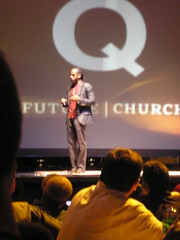 Jeff Johnson educated me. He took us through the ins and outs of the history of hip-hop culture and its effect on global culture in 18 minutes. I don’t really feel at all adequate to go through and try to detail that history… but wow. He knows his stuff.
Jeff Johnson educated me. He took us through the ins and outs of the history of hip-hop culture and its effect on global culture in 18 minutes. I don’t really feel at all adequate to go through and try to detail that history… but wow. He knows his stuff.
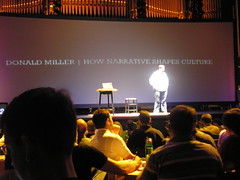

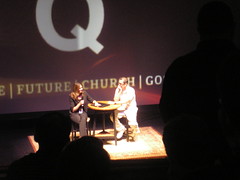
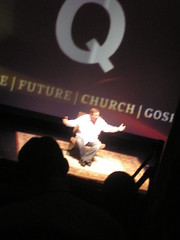
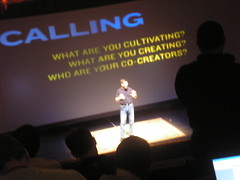 Our second speaker was Andy Crouch, editorial director of ChristianVisionProject.com for Christianity Today and author of the upcoming book, Culture Makers.
Our second speaker was Andy Crouch, editorial director of ChristianVisionProject.com for Christianity Today and author of the upcoming book, Culture Makers. 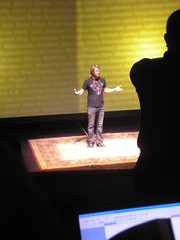 We arrived right before 10, got registered and found a seat in the balcony, and then the event began.
We arrived right before 10, got registered and found a seat in the balcony, and then the event began. if you ever wondered how a story can be told through just a few pictures and captions, yet totally move a soul to emotion and share in pain and hope and loss... then click
if you ever wondered how a story can be told through just a few pictures and captions, yet totally move a soul to emotion and share in pain and hope and loss... then click